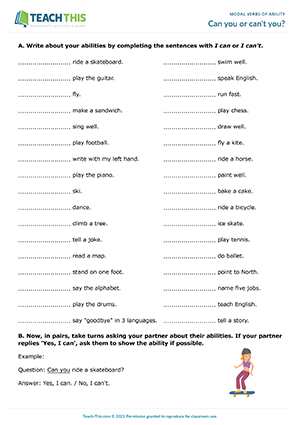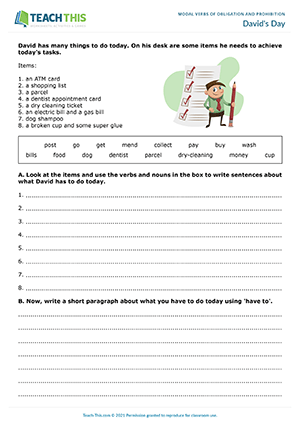

had to Johnnie’s fallen down the stairs! I _ call an ambulance! a. can If you are interested in losing weight, you _ try this new diet.


Modal verbs exercises advanced tv#
Modals-like verbs Modal Concept Example Like to Enjoy I like to watch TV Want to Desire John wants to buy a car Need to Necessity We really needed to talk to you Have to Obligation Susan had to pay the rent Have got to Have to I’ve got to go now Look forward to Future plan I look forward to see ing you again These are modal-like verbs They need to be conjugated Modals in Past : Modal + have + past participleĪ last tip There are few verbs which often serve as modals too. Modals in the Past They are modals referred to actions that happened in the past It must have been a difficult decision They should have invited her to their wedding MODAL + HAVE + verb in past participle She must be sick Would (1) Past (used to) When I was young, I would play soccer Would (2) Present unreal I would buy the car but I can’t afford itĭouble Concept Modal Modal Concept Examples Shall (1) Educated expression Offer Excuse me, I shall go now Shall I clean it? Shall (2) Contractual obligation The company shall pay on January 1st Could (1) Unreal Ability I could go if I had time Could (2) Past Ability She could play the piano, not anymore Can (1) Present Ability We can speak English Can (2) Permission Can I have a sweet? Single Concept Modal Modal Concept Examples Will Future Joe will travel to NY next week Might Small probability I might move to Canada some day Should Recommendation You should go to the doctor Ought to Formal recommendation We ought to know about first aids Had better Warning I had better study or I will fail the testĭouble Concept Modal Modal Concept Examples May (1) Permission May I come in? May (2) Good probability We may visit Mexico this summer Must (1) Responsibility Everyone must pay taxes Must (2) Assumption She didn’t arrive. What do they express? To understand it better we are going to divide them into 3 categories Single Concept Modal: they have one meaning Double Concept Modal: they have two meanings Modals in past : They are used to express a situation in the past They can have more than one meaning depending on the situationsĬategories Single concept Modals Double Concept Modals Modals in Past Will Might Should Ought to Had better May Must Would Shall Could Can Would have Could have Might have Should have May have Must have How do we use modals? Example: Mary could play the piano They do not accept conjugation They do not need other auxiliary verbs S Subject V Verb Mįorm He can ski He can s ski or He can ski s Would you like to come with me? Do you would like to come with me? They can’t be serious They don’t can be serious There is no “s” in singular There is no “do / does” in the question There is no “don’t / doesn’t” in the negativeįorm to can / caning to must /musting She must study We should have gone the other way He could play football in his youth (general ability ) Modal verbs do not have infinitives or – ing forms Modal verbs are followed by an infinitive without toįorm Modal verbs do not have all the tenses Modal verbs use other verbs to complete the tenses Can is completed with be able to Must is completed with have to They can play the piano They will be able to play the piano in the future You must come early You had to come early yesterday

What are modal verbs? They are: Can Could May Might Must Shall Should Will Would Ought to Modal verbs are sometimes referred to as Modal Auxiliary verbs because they help other verbs They are Auxiliary verbs that provide additional and specific meaning to the main verb of the sentence


 0 kommentar(er)
0 kommentar(er)
